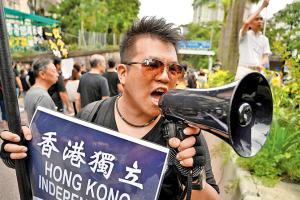Ticket sales for Sunday afternoon were halted and only two entrances were open. Protesters, some of them masked, faced off with police and chanted "Add Oil!", a Cantonese phrase for encouragement long embraced by protesters. But there were no clashes

A demonstrator shouts slogans during a march to the West Kowloon railway station in Hong Kong. Pic/AFP
Hong Kong: Tens of thousands of anti-government protesters rallied outside a controversial train station linking the territory to the Chinese mainland on Sunday, the latest mass show of anger as activists try to keep pressure on the city's pro-Beijing leaders. The rally was the first major large-scale protest since last Monday's unprecedented storming of parliament by largely young, masked protesters -- which plunged the international financial hub further into crisis.
ADVERTISEMENT
Hong Kong has been rocked by a month of huge marches as well as a series of separate violent confrontations with police, sparked by a law that would have allowed extraditions to mainland China. The bill has since been postponed in response to the intense backlash but that has done little to quell public anger, which has evolved into a wider movement calling for democratic reforms and a halt to sliding freedoms in the semi-autonomous city. Organisers said some 230,000 people snaked their way through streets in the harbour-front district of Tsim Sha Tsui, an area popular with Chinese tourists. Police said 56,000 turned out at the protest's peak. The march was billed as an opportunity to explain to mainlanders in the city what their protest movement is about. Inside China, where news and information are heavily censored, the Hong Kong protests have been portrayed as a primarily violent, foreign-funded plot to destabilise the motherland, not a mass popular movement over Beijing's increased shadow over the semi-autonomous hub.
"We want to show tourists, including mainland China tourists what is happening in Hong Kong and we hope they can take this concept back to China," Eddison Ng, an 18-year-old demonstrator, told AFP. Hong Kongers speak Cantonese but protesters were using Bluetooth to send leaflets in Mandarin -- the predominant language on the mainland -- to nearby phones, hoping to spread the word to mainlanders by digital word of mouth. "Why are there still so many people coming out to protest now?" one man said in Mandarin through a loudspeaker. "Because the Hong Kong government didn't listen to our demands." Many protest banners were written with the Simplified Chinese characters used on the mainland, not the Traditional Chinese system used in Hong Kong and Taiwan. And a lawmaker had to coach crowds how to chant "Students are not rioters" using the correct Mandarin pronunciation. Protesters are demanding the postponed extradition bill be scrapped entirely, an independent inquiry into police use of tear gas and rubber bullets, amnesty for those arrested, and for the city's unelected leader Carrie Lam to step down.
Beijing has thrown its full support behind Lam, calling on Hong Kong police to pursue anyone involved in the parliament storming and other clashes. In an interview with the BBC on Sunday, China's ambassador to Britain said the extradition bill was needed to "plug loopholes" and that Beijing has "full confidence in the Hong Kong government". Sunday's protest began on the waterfront -- the first time a rally has taken place off the main island -- and made its way to West Kowloon, a recently opened multi-billion-dollar station that links to China's high-speed rail network. Police placed the glass and steel structure in virtual lockdown. Long lines of water-filled security barriers surrounded the station while only those with previously purchased tickets were being allowed in. Ticket sales for Sunday afternoon were halted and only two entrances were open. Protesters, some of them masked, faced off with police and chanted "Add Oil!", a Cantonese phrase for encouragement long embraced by protesters. But there were no clashes.
The terminus is controversial because Chinese law operates in the parts of the station dealing with immigration and customs, as well as the platforms, even though West Kowloon is kilometres from the border. Critics say that move gave away part of the city's territory to an increasingly assertive Beijing. Local politician Ventus Lau Wing-hong, one of those organising the rally, said there was no desire to occupy the station given the catalyst for their movement was opposing people being sent to the mainland. Under Hong Kong's mini-constitution China's national laws do not apply to the city apart from in limited areas, including defence. Hong Kong also enjoys rights unseen on the mainland, including freedom of speech, protected by a deal made before the city was handed back to China by Britain in 1997. But there are growing fears those liberties are being eroded. Among recent watershed moments critics point to are the disappearance into mainland custody of dissident booksellers, the disqualification of prominent politicians, the de facto expulsion of a foreign journalist and the jailing of democracy protest leaders.
Catch up on all the latest Crime, National, International and Hatke news here. Also download the new mid-day Android and iOS apps to get latest updates
 Subscribe today by clicking the link and stay updated with the latest news!" Click here!
Subscribe today by clicking the link and stay updated with the latest news!" Click here!







